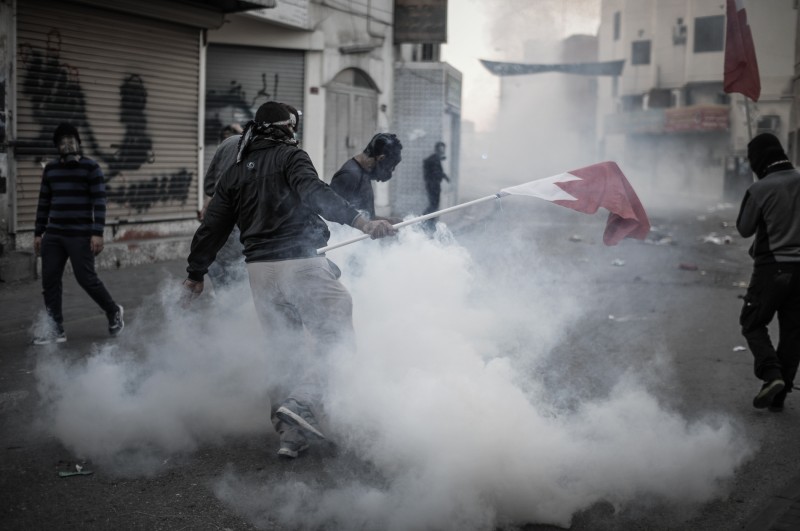
Protesters under attack with tear gas by riot police in January during clashes after protest demanding freedom of opposition leader Shaikh Ali Salman. Photograph by Majeed Tareef. Copyright: Demotix
Prominent political leader and Secretary General of the National Action Democratic Society (WAAD) Ibrahim Sharif was released on June 19, after having served four years and three months out of his five-year-sentence. Three days prior to that clergyman Shaikh Ali Salman, the Secretary General of leading opposition bloc Alwefaq National Islamic Society, was sentenced to four years in prison, leading to the question of whether Sharif's unexpected release and Salman's sentence were a coincidence or part of the government's strategy in facing unrest in the country which has continued since February 14, 2011.
Sharif's release was met by much fanfare across the country, muting some of the anger at Salman's sentence. Crowds of well-wishers gathered outside Sharif's home awaiting his return. Enas Oun, member of Bahrain Center for Human Rights (BCHR), tweeted a photograph of the activist on his way home:
المناضل ابراهيم شريف بعد الافراج عنه #bahrain pic.twitter.com/bf9X37GGWZ
— Enas oun (@glorybahrain) June 19, 2015
Activist Ibrahim Sharif after his release
With three days between the two events, it remains questionable whether the decision to release Sharif after sentencing Salman was a calculated move or a spontaneous consequence.
Sharif was arrested on March 17, 2011, and sentenced to five years in prison on June 22, 2011. However, according to Bahrain's law, prisoners may be released after serving three quarters of their time, which for Sharif was supposed to have been on December 3, 2014. He has since been communicating with authorities regarding his early release, but was not successful until three days after Salman's sentencing. Could it possibly be a tactic to deflect international pressure away, and substitute a hideous sentencing with the release of another prominent activist. Media attention was deflected from the outrage over Salman's sentencing to the semi-celebration of Sharif's release.
Mohammed Ashoor tweets a photograph of crowds which gathered outside Sharif's house as soon as rumours about his imminent release were spread:
Ebrahim Sharif's welcome party! الناس في إنتظار #إبراهيم_شريف. #Bahrain pic.twitter.com/v1dfvPCxUR
— الوطن ليلى وكلنا قيس (@MohmdAshoor) June 19, 2015
Salman's verdict also comes one day after the United Kingdom opened it's royal navy base in the country, a move widely criticized by the opposition in Bahrain.
Salman was arrested on December 28, 2014, and charged with “incitement to promote the change of the political system by force, threats and other illegal means”, “public incitement to loathing and contempt of a sect of people which will result in disrupting public disorder”, “publicly inciting others to disobey the law” and “publicly insulting the Interior Ministry,” according to Amnesty International.
Salman was acquitted from more serious charges related to plotting to overthrow the regime, and sentenced to four years for the remaining charges. Human rights organizations, including Amnesty International, condemned the arrest and sentencing of Salman stating he is being prosecuted for practicing his right to freedom of expression. So did the international community, including the United States, the United Kingdom and the United Nations.
American diplomat Tom Malinowski condemns prosecuting anyone for peaceful expression:
Ali Salman sentenced to 4 years in prison for a speech. No one should be prosecuted for peaceful expression http://t.co/xctQoJLQQl #Bahrain
— Tom Malinowski (@Malinowski) June 17, 2015
People took to the streets protesting the verdict and demanding his release. Another member of BCHR Hussain Radhi shares photographs from the protests:
Peaceful protests in different villages in #bahrain solidarity with political prisoners and Sh. Ali Salman #bahrain pic.twitter.com/Ey283CtKZk
— Hussain Radhi (@Huss3inRadhi) June 17, 2015
Amongst those expressing concern was the Iraqi Foreign Ministry which called on the Bahraini government to “reconsider the verdict” against Salman. The ambassadors of Bahrain, the United Arab Emirates (UAE) and Kuwait in Iraq protested the statement and delivered a message to the Iraqi Foreign Minister warning him of interfering with Bahrain's internal affairs, and to show respect for the country's sovereignty.
New York University journalism professor Mohamad Bazzi tweets:
#Bahrain is upset with #Iraq‘s FM for statement condemning 4-yr sentence against opposition leader Sheik Ali Salman | http://t.co/NNbC02tt7j
— Mohamad Bazzi (@BazziNYU) June 23, 2015
Emile Nakhleh, an expert on Middle East societies and member of Council on Foreign Relations, concludes that Alwefaq's boycott of elections in 2014 was used as an excuse to detain Salman, especially amid the divide in the ruling family, and the Crown Prince's critical position following the latest rumors that the crown could go to his younger brother Nasser. It seems that he had no choice but to support in cracking down on opposition.
Nakhleh explains:
the Crown Prince’s position within the family hierarchy has been increasingly precarious, especially in light of recent rumors that the succession to the throne might be rearranged in favor of his brother Nasser. Such a possibility, along the lines of the Saudi change of succession, is forcing Crown Prince Salman to be more circumspect in dealing with the opposition and in using al-Wefaq’s refusal to participate in the recent elections as a justification for persecuting its head.
Interestingly enough, the Ministry of Interior announced last month it will open six new buildings for inmates, two detention centers, and four rehabilitation centers across the country. Some say that is because of over population in the existing prison buildings.
Marc Owen Jones, who is active in tweeting about Bahrain, is one of them. He explains:
Ali Salman jailed, Ibrahim Sharif released. #Bahrain‘s prisons are so full they are operating a one in, one out policy.
— Marc Owen Jones (@marcowenjones) June 20, 2015
Active anonymous account Free Shawqi Radhi shares the same view:
Just like a coach exchange team players. #Bahrain take out sheikh Ali Salman and send him to jail, then release Ebrahim Sharif
— Free Shawqi Radhi (@FreedomPrayers) June 19, 2015







5 comments
They release a Sunni and imprison a Shia to try and appease ISIS before July 3